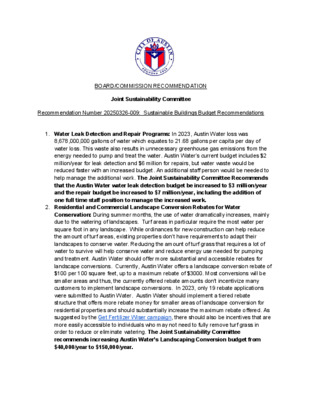Recommendation 20250326-009 - JSC Sustainable Buildings Budget Recommendations — original pdf
Recommendation

BOARD/COMMISSION RECOMMENDATION Joint Sustainability Committee Recommendation Number 20250326-009: Sustainable Buildings Budget Recommendations 1. Water Leak Detection and Repair Programs: In 2023, Austin Water loss was 8,678,000,000 gallons of water which equates to 21.68 gallons per capita per day of water loss. This waste also results in unnecessary greenhouse gas emissions from the energy needed to pump and treat the water. Austin Water’s current budget includes $2 million/year for leak detection and $6 million for repairs, but water waste would be reduced faster with an increased budget. An additional staff person would be needed to help manage the additional work. The Joint Sustainability Committee Recommends that the Austin Water water leak detection budget be increased to $3 million/year and the repair budget be increased to $7 million/year, including the addition of one full time staff position to manage the increased work. 2. Residential and Commercial Landscape Conversion Rebates for Water Conservation: During summer months, the use of water dramatically increases, mainly due to the watering of landscapes. Turf areas in particular require the most water per square foot in any landscape. While ordinances for new construction can help reduce the amount of turf areas, existing properties don’t have requirements to adapt their landscapes to conserve water. Reducing the amount of turf grass that requires a lot of water to survive will help conserve water and reduce energy use needed for pumping and treatment. Austin Water should offer more substantial and accessible rebates for landscape conversions. Currently, Austin Water offers a landscape conversion rebate of $100 per 100 square feet, up to a maximum rebate of $3000. Most conversions will be smaller areas and thus, the currently offered rebate amounts don’t incentivize many customers to implement landscape conversions. In 2023, only 19 rebate applications were submitted to Austin Water. Austin Water should implement a tiered rebate structure that offers more rebate money for smaller areas of landscape conversion for residential properties and should substantially increase the maximum rebate offered. As suggested by the Get Fertilizer Wiser campaign, there should also be incentives that are more easily accessible to individuals who may not need to fully remove turf grass in order to reduce or eliminate watering. The Joint Sustainability Committee recommends increasing Austin Water’s Landscaping Conversion budget from $40,000/year to $150,000/year. 3. Establish Sustainability Revolving Fund to Reduce GHG Emissions, Starting with Rooftop Solar and Refrigerant Leakage Mitigation: Revolving funds are an effective way to pay for upgrades that reduce greenhouse gas emissions. Many such upgrades also reduce costs by reducing electric, gas and/or water bills. Office of Climate Action and Resilience did an analysis of the financial costs and benefits of installing solar on City of Austin General Fund Buildings that shows that a $14 million investment in solar for those buildings would pay off in just over 6 years. Solar panels are generally warrantied for 25 years and can last much longer. The additional 19 years of warranted production would be worth at least $43.3 million. Investments in refrigerant leak detection and replacement of old HVAC systems with efficient heat pumps that use low GHG refrigerants at city buildings should also be a top priority. Goal 2 of the Austin Climate Equity Plan is to “By 2030, reduce community-wide greenhouse gas emissions from refrigerant leakage by 25%.” and an assessment of refrigerants at city facilities is currently in progress and will yield recommendations that need funding. The Joint Sustainability Committee recommends that $14 million in certificates of obligation be allocated to install solar on City of Austin buildings, starting with General Fund Buildings. These funds and the resulting savings should be put in a Sustainability Revolving Fund that is envisioned as part of the Comprehensive Climate Implementation Program. Additionally, $110,000 per year should be allocated for a new Sustainability Revolving Fund Program Manager for the Office of Climate Action and Resilience. 4. Air sealing task force and training program: According to RMI and DOE air sealing is the lowest cost path to lowering operational carbon. Air sealing is a sequencing and trade knowledge problem, not a technical or product problem, so training up our trade base is the best way to ensure higher quality, more air sealed buildings. Under this new program, Development Services would publish air sealing results of all new buildings and retrofits and Austin Energy would host training sessions for people working in the building trades on how to execute tight building envelopes. The Joint Sustainability Committee Recommends that Austin Energy be allocated $75,000 to conduct air sealing trainings. Vote: 11-0 Motion: Kaiba White Second: Anna Scott Against: Abstain: Off Dais: For: Anna Scott, Haris Qureshi, Kaiba White, Charlotte Davis, Heather Houser, Christopher Campbell, Marissa Bell, Lane Becker, Rodrigo Leal, Melissa Rothrock, Yure Suarez Absent: Chris Maxwell-Gaines, Amy Noel, Chris Crookham, Alberta Phillips, Diana Wheeler Attest: Rohan Lilauwala, Staff Liaison